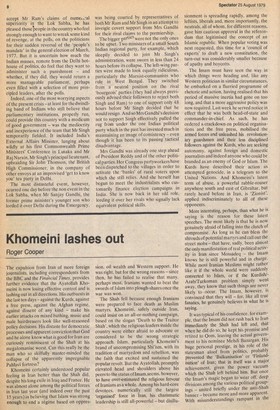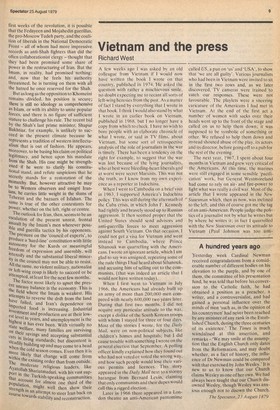Khomeini lashes out
Roger Cooper
The expulsion from Iran of more foreign journalists, including correspondents from the BBC and the Financial Times, provides further evidence that the Ayatollah Khomeini is now losing effective control and is lashing out in all directions. His outbursts in the last ten days — against the Kurds, against a free press, against the Afghan regime, against dissent of any kind — make his earlier attacks on mixed bathing, music and male hairdressers look like well-reasoned policy decisions. His distaste for democratic processes and apparent conviction that God and he alone know what is good for Iran are curiously reminiscent of the Shah at his megalomaniac worst. Can this really be the man who so skilfully master-minded the collapse of the apparently impregnable Pahlavi fortress?
Khomeini certainly understood popular feeling in Iran better than the Shah did, despite his long exile in Iraq and France. He was almost alone among the political forces in Iran last year (and indeed over the past 15 years) in believing that Islam was strong enough to end a regime based on oppres sion, oil wealth and Western support. He was right, but for the wrong reasons — since then, he has failed to realise that many, perhaps most, Iranians wanted to beat the swords of Islam into plough-shares once the war was won.
The Shah fell because enough Iranians were prepared to face death as Muslim martyrs. Khomeini, safely outside Iran, could insist on an all-or-nothing campaign, based on the slogan 'Death to the Traitor Shah', which the religious leaders inside the country were either afraid to advocate or considered to be the wrong strategic approach. Islam, particularly Khomeini's brand of uncompromising Shi'ism, with its tradition of martyrdom and rebellion, was the faith that excited and sustained the popular revolt. But the Ayatollah, promptly elevated head and shoulders above his peers to the status of Imam,seems, however, to have over-estimated the religious fervour of Iranians as a whole. Among his hard-core devotees, numerically still the largest 'organised' force in Iran, his charismatic leadership is still all-powerful — but disillu sionment is spreading rapidly, among the leftists, liberals and, more importantly, the neutrals, all of whom, for different reasons, gave him cautious approval in the referendum that legitimised the concept of an Islamic republic. When popular voting was next requested, this time for a 'council of experts' to draft a new constitution, the turn-out was considerably smaller because of apathy and boycotts.
The Imam must have seen the way in which things were heading and, like any Western politician in similar circumstances, he embarked on a flurried programme of rhetoric and action, having realised that his period of massive inertia had gone on too long, and that a more aggressive policy was now required. Last week he served notice in effect that he was both head-of-state and commander-in-chief. As such, he has ordered a crackdown on political organisations and the free press, mobilised the armed forces and unleashed his revolutionary guardsmen and their less disciplined followers against the Kurds, who are seeking autonomy, against foreign and domestic journalists and indeed anyone who could be branded as an enemy of God or Islam. The Kurds have described their action as attempted genocide, in a telegram to the United Nations. And Khomeini's latest term of abuse, a powerful rabble-rouser anywhere south and east of Gibraltar, but rarely heard before in Iran, is 'Zionist', applied indiscriminately to all of these opponents.
More interesting, perhaps, than what he is saying is the reason for these latest speeches. The most likely is that he is now genuinely afraid of falling into the clutch of compromise. As long as he can bless the shrouds of potential martyrs and call out the street mobs that have, sadly, been almost the only manifestation of real political activity in Iran since Mossadeq — the Imam knows he is still powerful and in charge. While most Iranian Muslims might rather like it if the whole world were suddenly converted to Islam, or if the Kurdish/Arab/Turkoman problem simply went away, they know that such things are never likely to occur. The Imam, however, is convinced that they will — for, like all true fanatics, he genuinely believes in what he is saying.
It was typical of his confidence, for example, that the Imam did not rush back to Iran immediately the Shah had left and, that when he did do so, he kept his promise and retired to Qom, leaving the actual government to his nominee Mehdi Bazargan. His huge personal prestige, in his role of the statesman aloof from politics, probably prevented the 'Balkanisation' or 'Finlandisation' of Iran; that in itself was a major achievement, given the power vacuum which the Shah left behind him. But once the Imam's magic began to 'wear off, deep divisions among the various political groupings — united briefly under the anti-Shah banner — became more and more apparent. With misunderstandings rampant in the first weeks of the revolution, it is possible that the Fedayeen and Mojahedin guerillas, the pro-Moscow Tudeh party, and the coalition of liberals in the National Democratic Front — all of whom had more impressive records as anti-Shah fighters than did the often collaborationist clergy — thought that they had been promised some share of Power in the restructuring of Iran. But the Imam, in reality, had promised nothing; and, now that he feels his authority threatened, he is turning on them with all the hatred he once reserved for the Shah. But as long as the opposition to Khomeini remains divided, his position is secure; there is still no ideology as comprehensive as Islam, or with its ability to unite popular forces, and there is no figure of sufficient stature to challenge his rule. The recent bid by the Shah's last prime minister, Shapur Bakhtiar, for example, is unlikely to succeed in the present climate because he represents a tradition of western intellectualism that is out of fashion. He appears, moreover, to be basing his claim on political legitimacy, and hence upon his mandate from the Shah. His case might be strengthened if he were to clarify his constitutional stand, and refute suspicions that he secretly stands for a restoration of the monarchy. But, however attractive he may be to Western observers and emigre' Iranians, he carries little weight in the slums of Teheran and the bazaars of Isfahan. The same is true of the other contestants for Power, whether on the left, right or centre. The outlook for Iran, then, seems to be an escalation of the present unrest, frontal assault by the Imam's men wherever possible and guerilla tactics by his opponents. The pressure on the `council of experts', to produce a 'hard-line' constitution with little autonomy for the Kurds or meaningful freedom of expression and assembly, will intensify and the substantial liberal minoritY in the council may not be able to resist. All the same, no violent military, nationalist or left-wing coup is likely to succeed or be attempted, at least for the next few months. The factor most likely to upset the present uneasy balance is the economy. This is the field where the Imam is weakest. His :attempts to reverse the drift from the land .nave failed, and Iran's dependence on nn ported food is increasing. Industrial investment and production are at their lowest level in years, and unemployment is the ,lighest it has ever been. With virtually no otate welfare, many families are surviving cut their savings and accepting substantial sts in living standards; but discontent is eadily building up and may come to a head when the cold season comes, Even then it is wmoithre likely that change will come from in the existing order than from outside. The •Yrato moderate religious leaders, like Aallah Shariatmadari, with his vast SUPthat in the Turkish-speaking communities account for almost one third of the Population, might well then show their sctrength in an attempt to steer Iran back on ourse towards stability and reconstruction.































 Previous page
Previous page